After decade of rapid growth, express courier services look to more advances, expansion
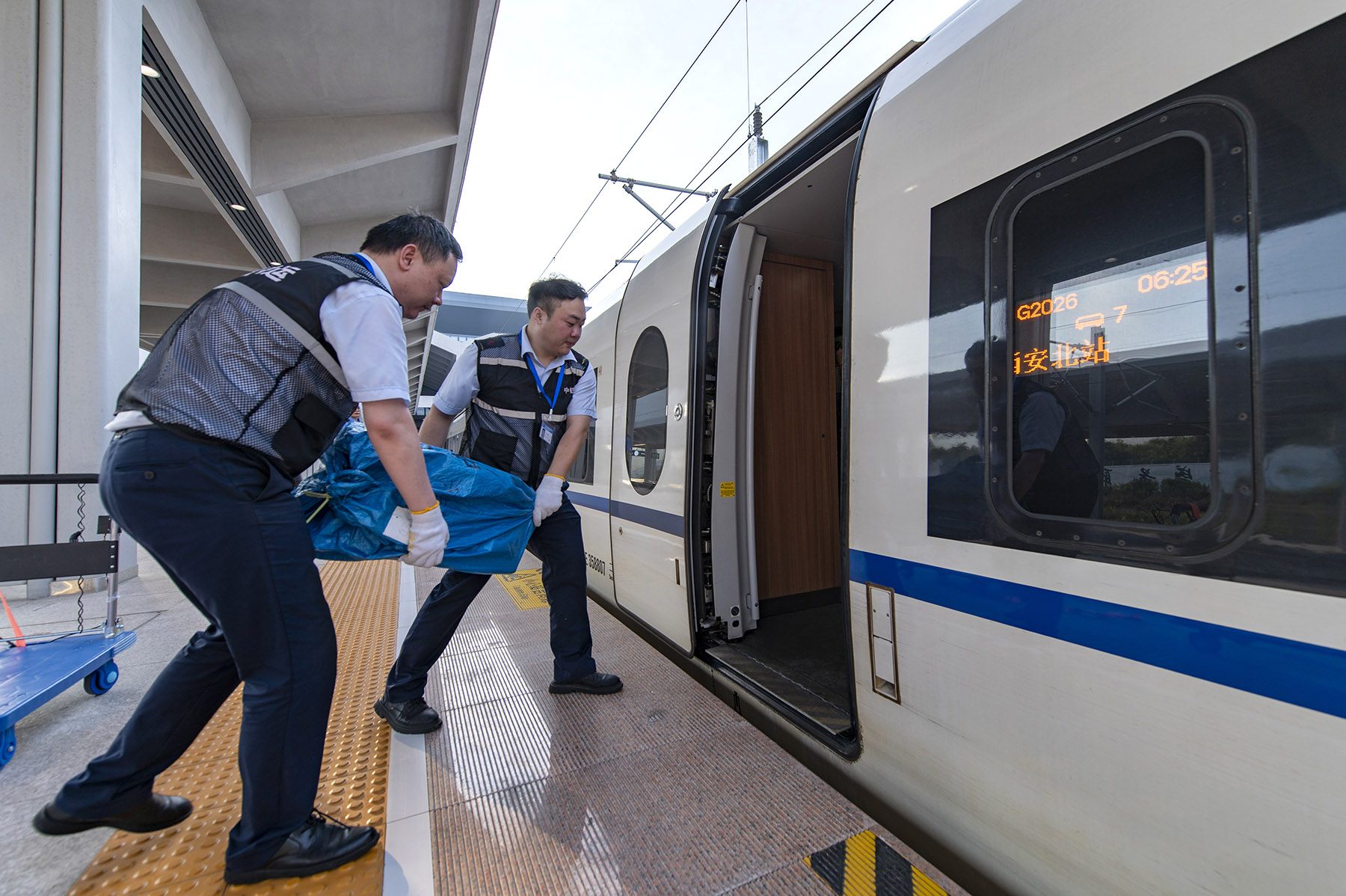
Each day, more than 500 million parcels are collected nationwide, meaning that every second nearly 6,000 items are shuttled into the express delivery process.
These statistics, showing average daily operations, were released by the State Post Bureau in July, and reflect the staggering size and progress of the industry in China.
The sector, which has maintained its position as the world's largest express delivery market for 11 consecutive years, is another hallmark of the country's efficiency and technological innovation, experts said.
READ MORE: China accelerates express delivery green packaging amid e-commerce boom
From 2014 to 2024, China's express delivery volume leaped from 14 billion to a whopping 174.5 billion parcels, accompanied by a significant drop in the average delivery price from over 14 yuan ($1.95) to 8 yuan per parcel.
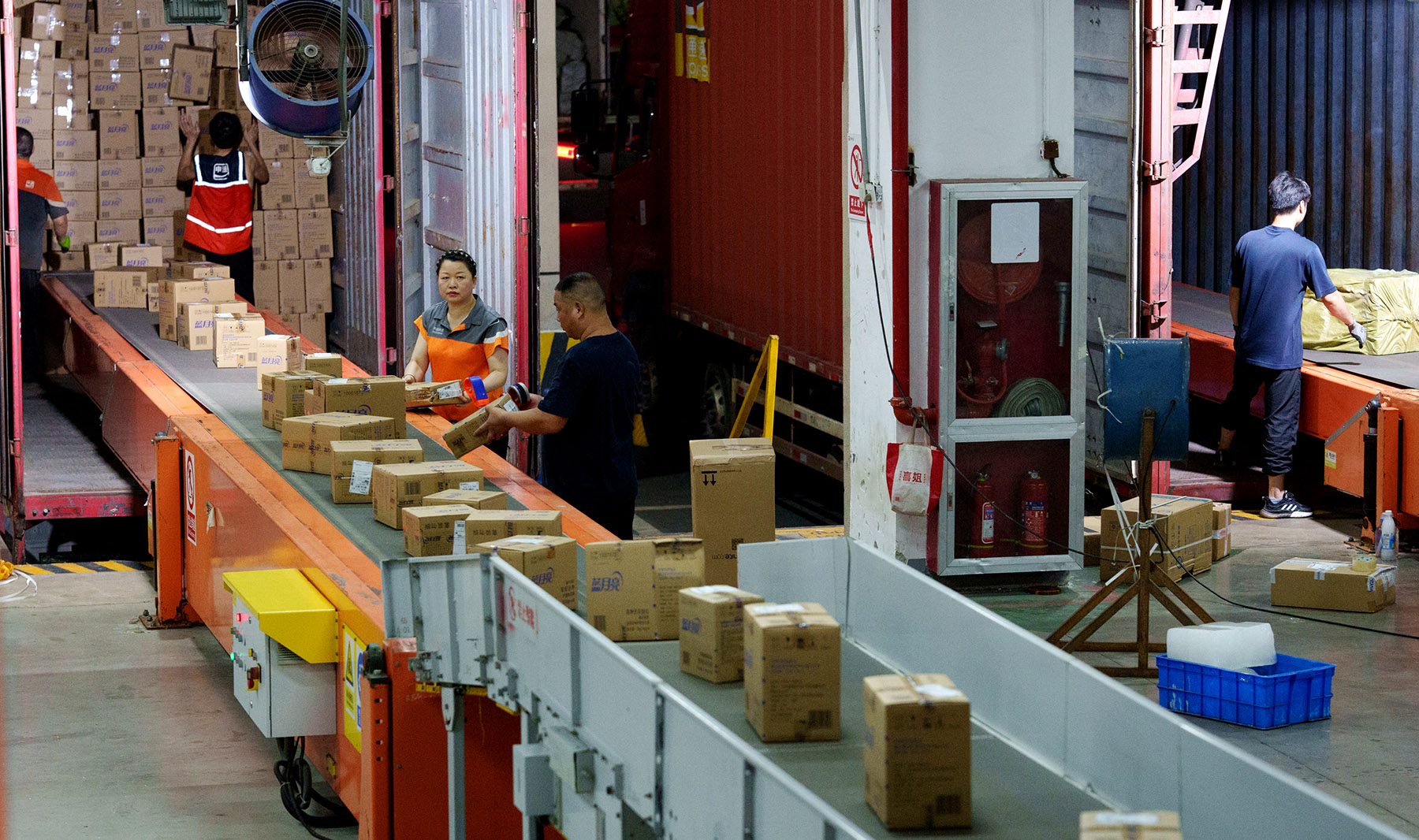
Behind such colossal volume is efficient resource allocation and technological prowess, with the industry evolving from labor-intensive operations to technology-driven processes.
"The moment a user places an order to send a parcel on his or her mobile phone, the smart system of a courier company activates a chain of automated responses, including which courier will be assigned to pick up the parcel, which outlet the parcel will go to, which vehicle it will be on, and its scheduled arrival time at various points along the route," said Yang Qingyue, a public relations manager for delivery company ZTO Express.
"The entire process is automated, with heavy human intervention only required at the sending and receiving ends, including interactions with the clients," Yang said.
Zhao Chongjiu, director of the State Post Bureau, attributed the acceleration of express deliveries in the first half of this year to the expanded use of air services and high-speed rail, and a wider application of unmanned vehicles and stations, together with artificial intelligence technologies.
"All of this resulted in more areas being included in service circles, where customers can receive their parcels the next day," said Zhao.
The bureau aims to further improve the industry through intelligent sorting, encrypted transportation, real-time tracking, AI-powered anomaly detection, and the expansion of unmanned delivery stations, industry experts said.
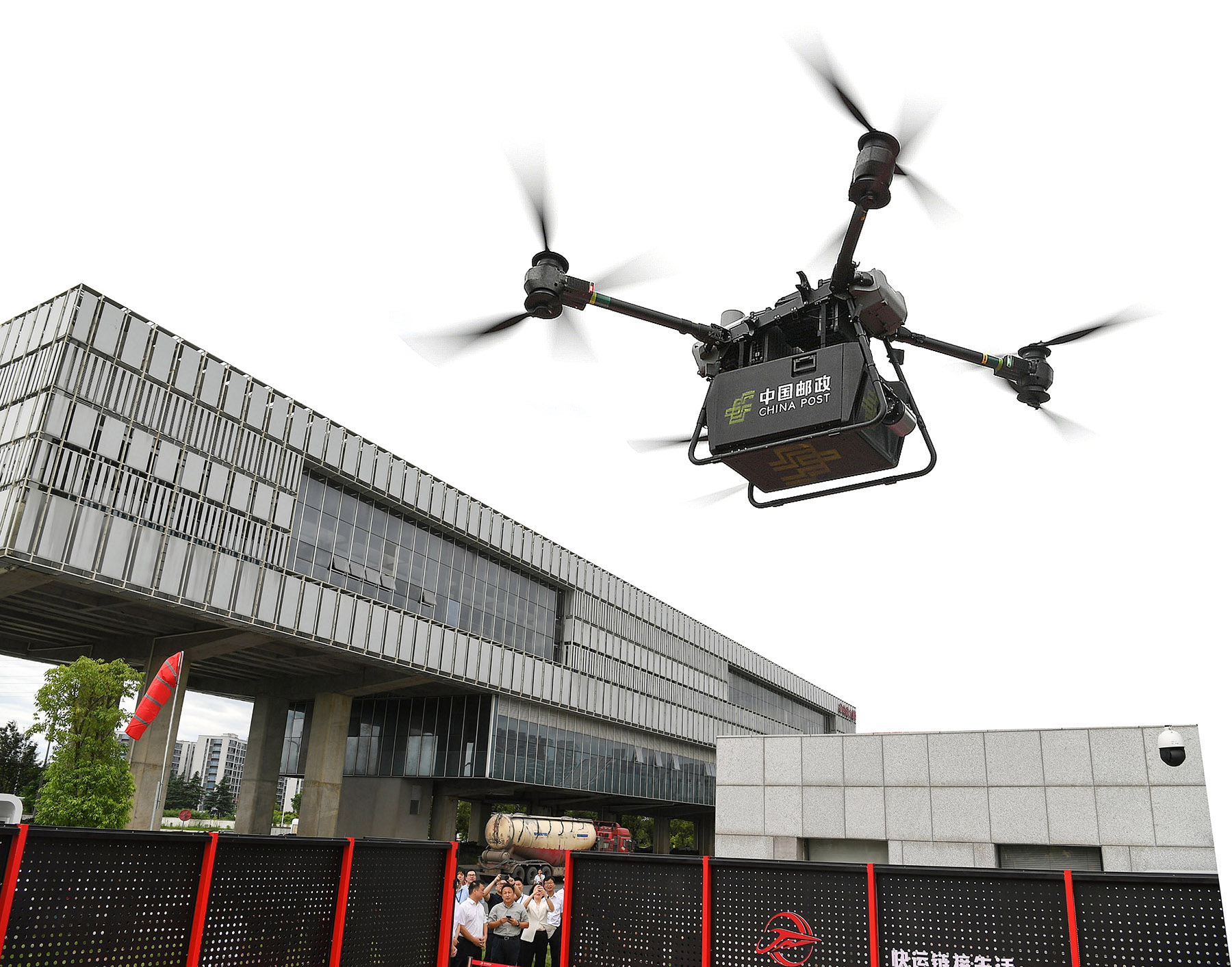
Automated, intelligent
At the Shanghai sorting center of YTO Express in Qingpu district on the municipality's outskirt, Qian Yi and his colleagues deal with parcels arriving from outside the city.
Under the scorching summer sun, conveyor belts that are part of the smart sorting system are extended into delivery trucks.
Workers place parcels on the conveyor belts one after another, ensuring that the electronic waybills face upward. This allows the automated sorting system to scan the barcode, identify the parcel's destination, and direct it to the correct location after it runs through a complex network of conveyor belts.
The cross-belt sorter consists of interconnected sections, akin to train compartments, with each section processing a single parcel. As a parcel reaches its correct position, the belt shifts and guides it into a collection bag below.
When the bags are full, workers seal them and place them on conveyor belts that carry them to trucks bound for distribution outlets.
"The conveyor belts move at a speed that can carry 240 packages per minute, which is a dizzying speed but accurate, and requires no human intervention or secondary verification," said Qian, the 29-year-old leader of the parcel-sorting team at the center.
"Sorting centers were not like this a decade ago. Manual sorting used to be labor-intensive. Workers were stationed on either side of straight conveyor belts, with each person responsible for parcels destined for a district of Shanghai. They had to be swift in both their mind and hand movements," said Qian.
Manual operations sometimes collapsed if the workload was too heavy during periods such as the "Double 11" shopping festival. "However, with the current system, the center can process up to 5 million parcels a day," he said.
Covering an area of roughly 2.5 standard soccer fields and equipped with five cross-belt sorters, the sorting center epitomizes the evolution of China's express delivery industry. "Today, most industry players headquartered in Qingpu boast an average delivery time within 45 hours nationwide at a cost of just a little more than 3 yuan per parcel. There is a saying among us: 'It costs only half a dollar to deliver a parcel nationwide'," Qian said.
Qingpu, the only Shanghai district connecting to both Jiangsu and Zhejiang provinces and adjacent to the Shanghai Hongqiao international transportation hub, has become home to the national and regional headquarters of many courier companies. Of every 10 courier parcels delivered nationwide, seven are handled by Qingpu-headquartered express delivery companies.
Major players have established large technology divisions to serve as the brain of their operations. Most have automated sorting lines and remote visual management systems that connect their headquarters with business outlets nationwide.
At the big data center of YTO Express' national headquarters in Qingpu, a huge screen shows busy scenes at parcel-sorting centers nationwide, the status of thousands of moving trucks, as well as real-time tracking of the entire delivery process of all parcels from collection to dispatch.
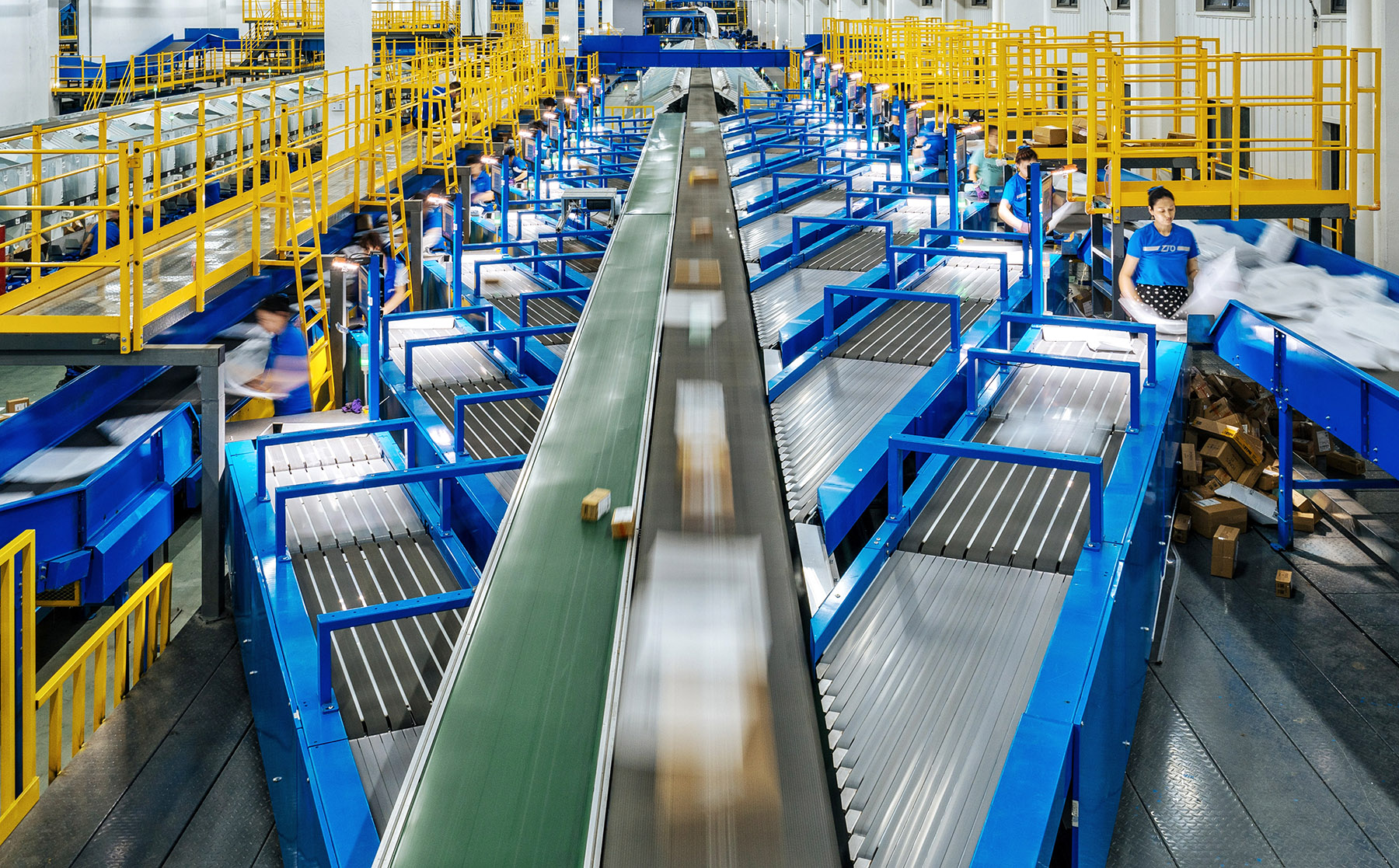
Unmanned vehicles
The integration of new technologies, such as unmanned vehicles and drones, is reshaping courier services.
In March, a drone carrying imported goods took off from a bonded zone in Qingbaijiang district, Chengdu, Sichuan province, and landed at a ZTO Express' parcel-sorting center in the city's Xindu district after a 20-minute flight.
Unmanned vehicles then took over to deliver the parcels to an outlet. ZTO Express has reported a 50 percent increase in delivery efficiency and a nearly one-third reduction in operating costs since adopting a transportation model combining drones and unmanned vehicles.
"The use of unmanned equipment is also intended to complete the last mile of express transportation in complex road conditions, such as mountainous and rural regions. So far, about 1,000 unmanned vehicles have been put into operation across the ZTO Express network, covering more than 180 cities," said Yang, the manager.
Yunda Express is also rapidly introducing unmanned vehicles, with over 2,000 operating in urban communities and rural areas. In Tongxiang, Zhejiang province, the company's local branch has deployed 30 unmanned vehicles, with each able to send up to 2,000 parcels per day, enhancing logistics efficiency and reducing costs by 30 percent compared with traditional methods.
In Baoji, Shaanxi province, a Yunda outlet uses 10 unmanned vehicles for short distance transportation between its warehouse and a district branch. The daily delivery volume of the outlet has reached 70,000, with around 50,000 done by the unmanned vehicles.
Yunda is also expanding its use of drones, with five drone routes already in operation. The drones are used for high-value deliveries — such as fresh food and medical supplies — in cities including Hangzhou and Jiaxing, significantly reducing delivery times and labor costs.
The rapid progress in high-tech applications has been continuously supported by local governments eager to encourage digital technologies, such as intelligent warehousing, scheduling based on big data, and route optimization.
Around a decade ago, when the industry faced large-scale equipment upgrades and transformation, the Qingpu district authority established a special fund to subsidize intelligent technological improvements and construction of digital platforms. It also facilitated green channels for banks and other investment and financing platforms.
Data from the district authority showed that last year, the transportation cost of express delivery companies headquartered in Qingpu dropped to around 0.41 yuan, a year-on-year fall of 10 to 30 percent.
"Only with such affordable logistics costs can the rise of numerous 'Taobao villages' in China be possible," said Yang from ZTO.
In 2016, Qingpu was designated as the sole national demonstration zone for the transformation and development of the express delivery industry. Three years later, the modern logistics industry became the first 100-billion-yuan industrial cluster in the district.
However, Liu Jingjun, deputy head of Chonggu town in Qingpu, said that the volume of express deliveries is already at a high level and is unlikely to further rise significantly. The focus, therefore, will be on high-quality development and seeking productivity from technology, he said.
"For example, technology can play a part in further reducing deliveries that go missing and increasing loading efficiency. If a vehicle can carry 10 boxes, it shouldn't drive off with nine boxes loaded," said Liu.
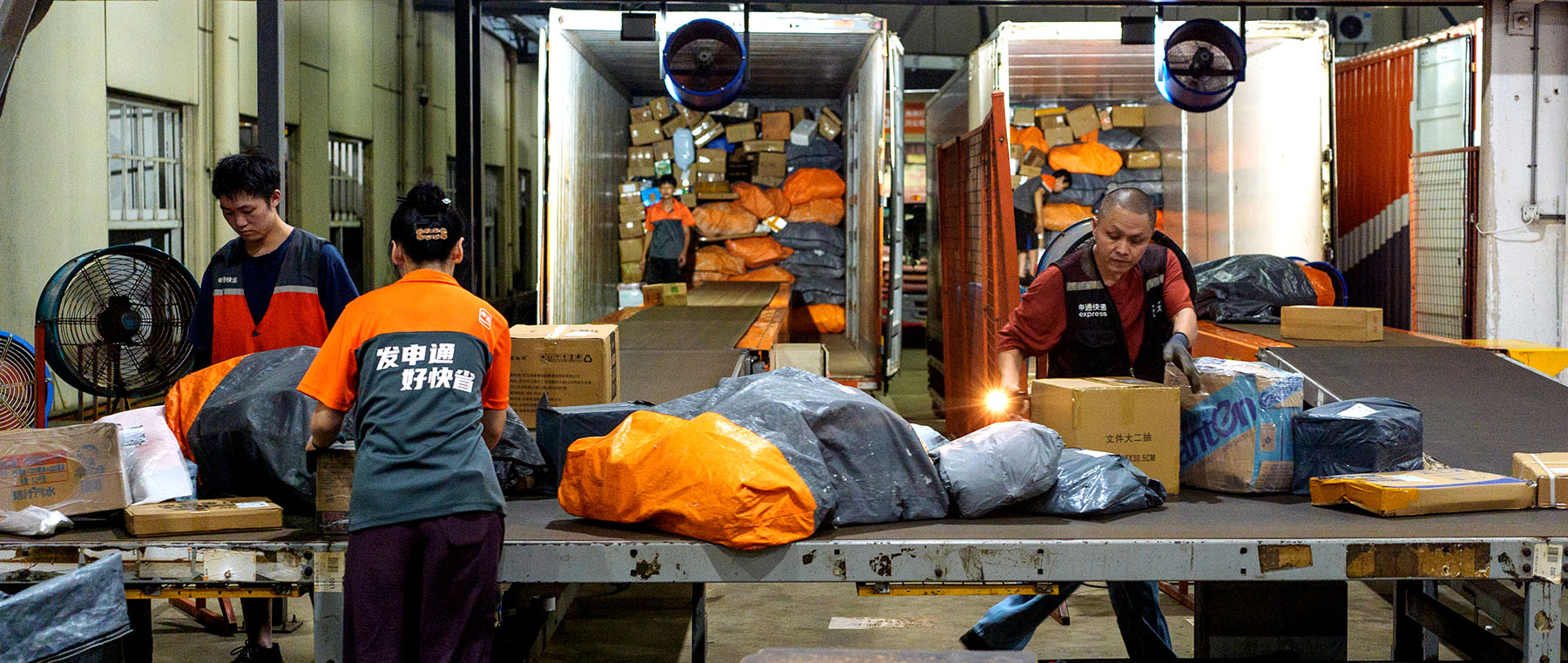
Overseas expansion
In recent years, many leading domestic express delivery companies have decided to expand overseas. Part of the objective was to replicate China's successful experience in developing countries.
ZTO Express' Yang said his company had transplanted a model similar to the one in China in some African nations and Cambodia. "Having the electronic delivery waybills with a barcode was a major shift for them. Machine recognition and the corresponding automated sorting only become possible when handwritten waybills are not in use anymore," he said.
Courier company J&T Express has also been pushing its presence in Southeast Asia, the Middle East, North Africa, and Latin America. Its express network now covers 13 countries.
In Southeast Asia, the company has maintained the top market share in the express delivery sector for five consecutive years. In the second quarter of this year, it reported year-on-year growth of nearly 66 percent in parcel volume, with a daily average parcel volume of 18.5 million. In emerging markets, including the Middle East, North Africa, and South America, parcel volume increased by 23.7 percent year-on-year to 89.4 million daily.
Meanwhile, YTO Express has opened more than 150 airfreight routes worldwide, and established overseas end-to-end delivery capabilities in more than 10 countries and regions.
In June 2024, the company joined hands with Kazakhstan's national postal service to launch cross-border express services between the countries. They also established a joint venture to start building a parcel-sorting center in Almaty.
This facility will not only serve as an overseas warehouse for YTO to launch into the Central Asian market, but also develop into a trade center integrating functions, such as bonded warehousing, exhibitions, and commodity trading, said the company.
Another landmark for YTO is a cargo airport in Jiaxing city, Zhejiang province, positioned as a global aviation logistics hub, which will begin operations this year.
Jiang Ze, director of media affairs at the company, said the project covers 1 square kilometers, and will integrate airfreight and intelligent warehousing. "The airport will make sure that Chinese goods reach Europe and the United States in a little more than 10 hours, supporting the realization of YTO's vision of buying and selling globally," Jiang said.
Yunda Express is also helping cross-border e-commerce enterprises establish international logistics in important overseas markets, providing services such as warehouse management and system development.
ALSO READ: Over 1.9b parcels handled in China during Spring Festival holiday
Yunda, for example, has achieved a single express waybill from China to South Korea. The company has also established direct service networks in Seoul, Incheon, and Busan, capable of stocking and moving 300,000 parcels a day, said Guo Pengcheng, the company's head of media affairs.
"Chinese products enter Yunda's overseas warehouse in South Korea in advance, which allows buyers to get their parcels within two to three days after they place orders," Guo said.
The courier industry sees the upgrade from express operators to supply chain integrators as the next major growth point.
In June, YTO's international supply chain reached a cooperation agreement on cross-border supply chain service with Chinese tech company Xiaomi Group, becoming its supply chain logistics service provider.
Under the agreement, YTO will provide one-stop, end-to-end logistics supply chain services for Xiaomi electronic components exported to the South Asian market.
Contact the writer at zhouwenting@chinasaily.com.cn


